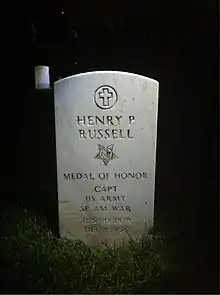Henry P. Russell
Henry Peter Russell (June 10, 1878 – December 1, 1956) was a landsman serving in the United States Navy during the Spanish–American War who received the Medal of Honor for bravery.
Henry P. Russell | |
|---|---|
 Grave at Arlington National Cemetery | |
| Born | June 10, 1878 Quebec, Canada |
| Died | December 1, 1956 (aged 78) |
| Place of burial | |
| Allegiance | United States |
| Service/ | United States Navy |
| Rank | Landsman |
| Unit | U.S.S. Marblehead |
| Battles/wars | Spanish–American War |
| Awards | Medal of Honor |
Biography
Russell was born June 10, 1878 in Quebec, Canada and after enlisting in the United States Navy on December 11, 1896, was sent to fight in the Spanish–American War aboard the U.S.S. Marblehead as a landsman.[1]
He was awarded the Medal of Honor for participating in cutting a communications cable while serving on the cruiser USS Marblehead.
Russell was discharged from the Navy on December 10, 1899. On April 20, 1905 he joined the U.S. Army, served in the cavalry and artillery, and rose to the rank of master sergeant before retiring January 28, 1930. About 1910 he served with the 14th Cavalry Regiment in the Philippines.
Shortly after his discharge from the Regular Army, Russell was commissioned as a 1st lieutenant in the New Hampshire National Guard on May 10, 1930 and secured employment on the staff of the Adjutant General of New Hampshire. He was promoted to captain on October 11, 1931. [2] [3] In 1940 he was living in Portland, Maine.
Captain Henry P. Russell died at the Maine Veterans Hospital in Togus, Maine on December 1, 1956, and is buried at Arlington National Cemetery Arlington, Virginia.[4] His grave can be found in the section 31, lot 6377.[4]
Awards
Medal of Honor citation
Rank and organization: Landsman, U.S. Navy. Born: 10 June 1878, Quebec, Canada. Accredited to: New York. G.O. No.: 521, 7 July 1899.
Citation:
On board the U.S.S. Marblehead during the operation of cutting the cable leading from Cienfuegos, Cuba, 11 May 1898. Facing the heavy fire of the enemy, Russell displayed extraordinary bravery and coolness throughout this action.[1]
References
- "War with Spain; Russell, Henry P. entry". Medal of Honor recipients, War With Spain. United States Army Center of Military History. August 3, 2009. Retrieved July 20, 2010.
- http://www.canadianmedalofhonor.com/sunday-evenings-blogs/sailor-turned-embalmer-then-soldier-and-medal-of-honor-man-with-probably-a-30-year-plus-career
- National Guard Register, 1931. pg. 595.
- Arlington National Cemetery